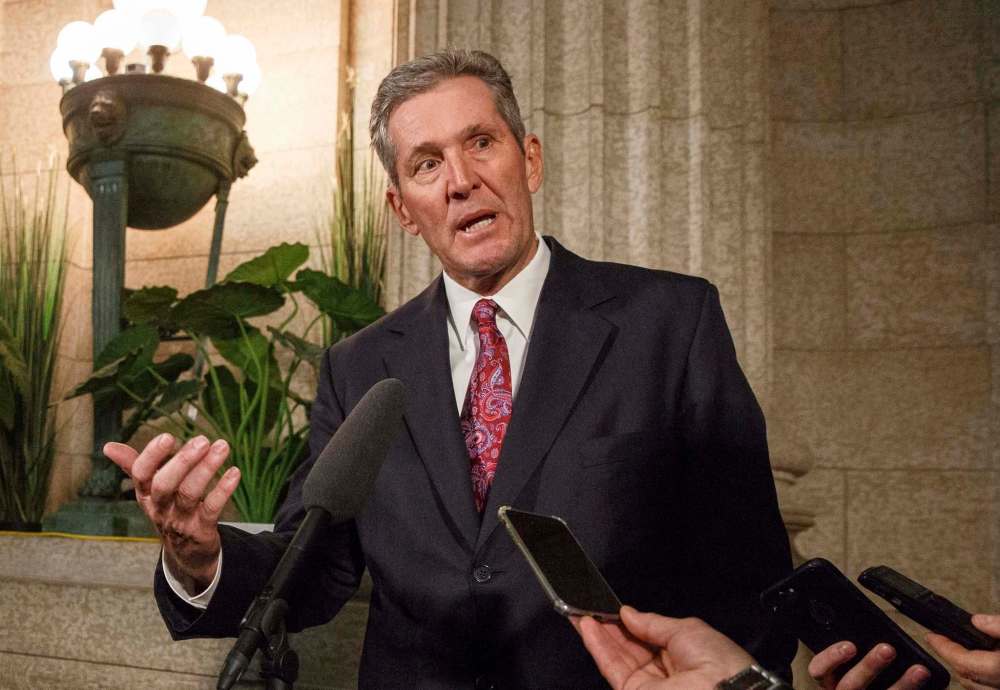Pallister slams Ottawa for ‘two-tier’ carbon tax plan
Advertisement
Read this article for free:
or
Already have an account? Log in here »
To continue reading, please subscribe:
Monthly Digital Subscription
$19 $0 for the first 4 weeks*
- Enjoy unlimited reading on winnipegfreepress.com
- Read the E-Edition, our digital replica newspaper
- Access News Break, our award-winning app
- Play interactive puzzles
*No charge for four weeks then billed as $19 plus GST every four weeks. Offer only available to new and qualified returning subscribers. Cancel any time.
Read unlimited articles for free today:
or
Already have an account? Log in here »
Hey there, time traveller!
This article was published 23/10/2018 (2257 days ago), so information in it may no longer be current.
OTTAWA — Premier Brian Pallister is chastising Ottawa for politicizing carbon pricing across the country, arguing the Liberals are favouring certain provinces while undermining local agriculture.
“It appears to me that they’re introducing a two-tier carbon tax structure in the country,” the Manitoba premier told reporters Wednesday. “Yet, they’re saying ours isn’t good enough and we have to up our game.”
His comments came a day after Ottawa announced how provinces without their own carbon plan will pay the federal levy, which will be remitted to residents through tax rebates. Earlier this month, Pallister abandoned a flat-tax proposal after Ottawa insisted it would charge a top-up so Manitoba met an escalating benchmark.

Pallister claims Prime Minister Justin Trudeau gave Newfoundland and Labrador “special consideration” for Muskrat Falls, a hydroelectric project, which is still under construction.
During Trudeau’s Sept. 11 visit to Winnipeg, the premier pushed him for flexibility on Manitoba’s flat plan, citing hydro projects such as the Keeyask Generating Station and Bipole III Transmission Line.
Not doing so amounts to “one size for everybody east of the Ottawa River,” Pallister said, with a “less stringent” cap-and-trade system in Quebec, and allowing Newfoundland to replace its existing gas tax with the federal carbon levy.
“That is not something that was ever permitted for us, or that we were ever told other provinces were going to be allowed,” Pallister said.
Federal officials noted the change will have Newfoundland go from its current tax, which adds 10 cents per litre more than what Manitoba charges, onto the federal carbon plan. Pallister argued that means giving the leeway Manitoba was denied.
“It doesn’t make sense. It’s not fair. It’s not right,” he said.
Intergovernmental Affairs Minister Dominic LeBlanc rejected that line of argument.
“Premier Pallister changed his mind at five minutes to midnight, and withdrew a plan that he’d submitted previously. He can explain to Manitobans why he thinks that’s an effective action on climate change,” he told the Free Press Tuesday, saying Pallister originally had “an effective plan.”
LeBlanc’s spokesman, Vincent Hughes, wouldn’t address the provincial comparisons Pallister drew Wednesday.
“In making pollution free again, they joined the Harper-Scheer Conservatives, who have no plan to fight climate change,” he wrote.
Pallister had also decried the Liberals allowing Newfoundland to not raise its carbon price until the other Atlantic provinces did, but federal officials said the plans are revised yearly, and any province that falls short would have the backstop imposed.
The federal plan, which will see gas prices rise in April, is already riling Manitoba business.
Bill Campbell, head of Keystone Agricultural Producers, said farmers are concerned how the federal plan will impact a sector he said is already yielding narrow margins.
“We have become as efficient as we possibly can, but we’ve seen eroded margins, and we have very limited capability to deal with these new programs,” he said.
Pallister’s plan included exemptions for space heating for livestock, and on fuel used to dry out grain, which Campbell said is taking in more moisture because of changing weather patterns. “Farmers need help in adapting to climate change.”
Pallister claimed part of the reason he ditched his flat tax is because he’d rather fight the federal rules on agriculture before they come in.
A spokeswoman for Environment Minister Catherine McKenna noted the tax doesn’t apply to gasoline and diesel for on-farm use, and farmers will be eligible for “upcoming small-business support programs to ensure increase the energy efficiency of their operations.”
Meanwhile, David McLaughlin a director with the International Institute for Sustainable Development, said Manitoba will also be subject to a federal system for regulating large emitters that could have consequences for six heavy-industry plants in the province.
McLaughlin previously helped design Pallister’s green plan, which he said was tailored with performance standards, emission caps and exemptions for companies at risk of being undercut by companies operating abroad, such as the Koch fertilizer plant in Brandon and Graymont limestone plant in Faulkner.
Now, those firms are subject to a federal plan that largely follows the same carbon-credit system — but with federal targets McLaughlin warns could have adverse impacts on Manitoba firms. “These are details, but they will absolutely matter to them.”
dylan.robertson@freepress.mb.ca
jessica.botelho@freepress.mb.ca
History
Updated on Thursday, October 25, 2018 11:22 AM CDT: Clarified.


